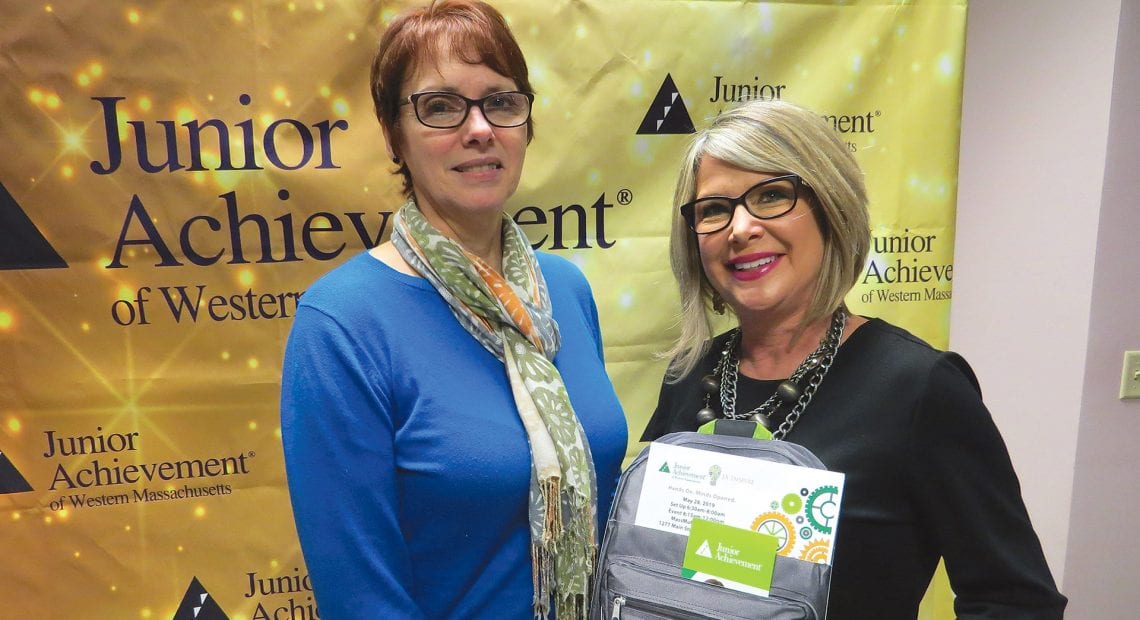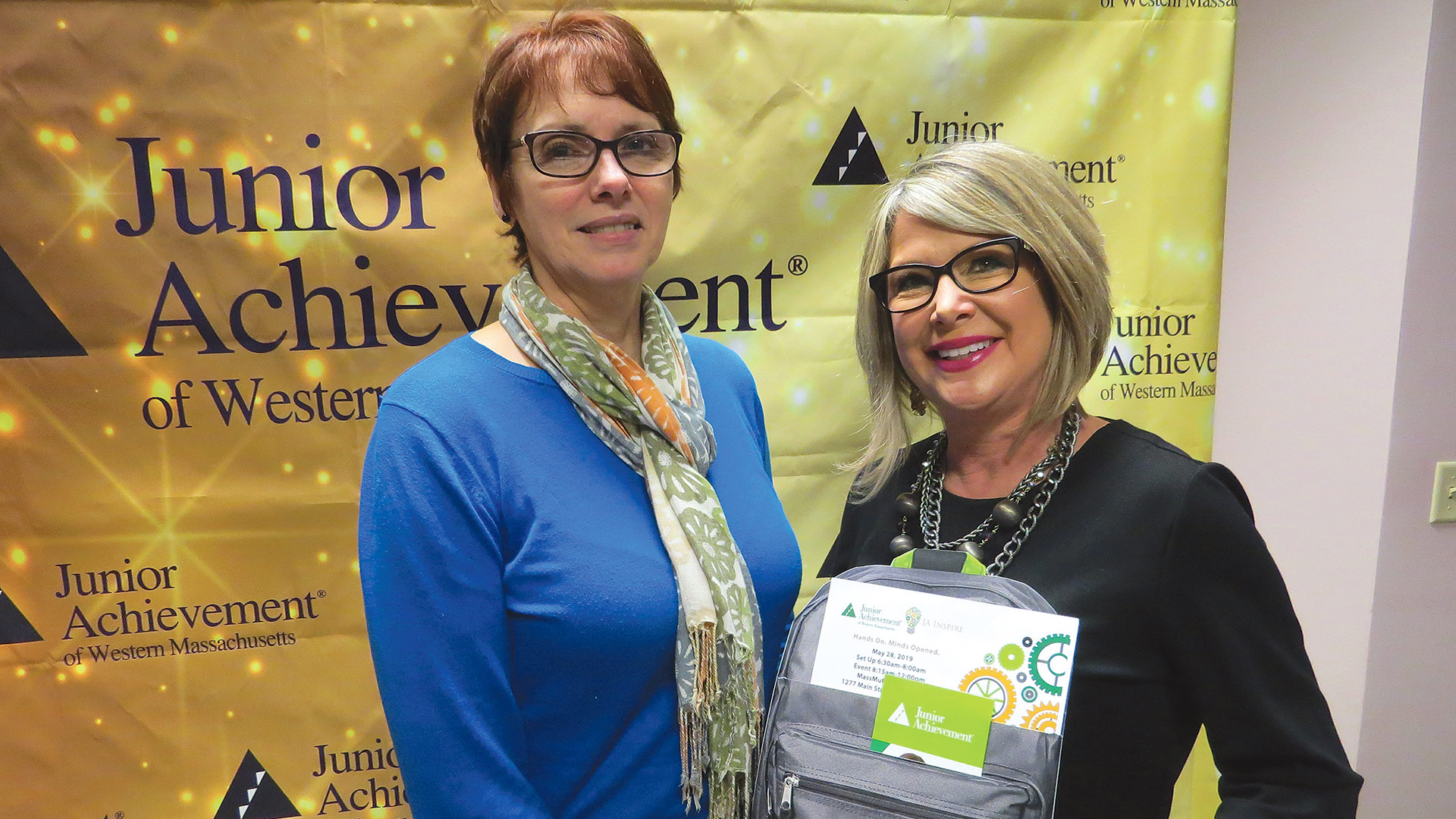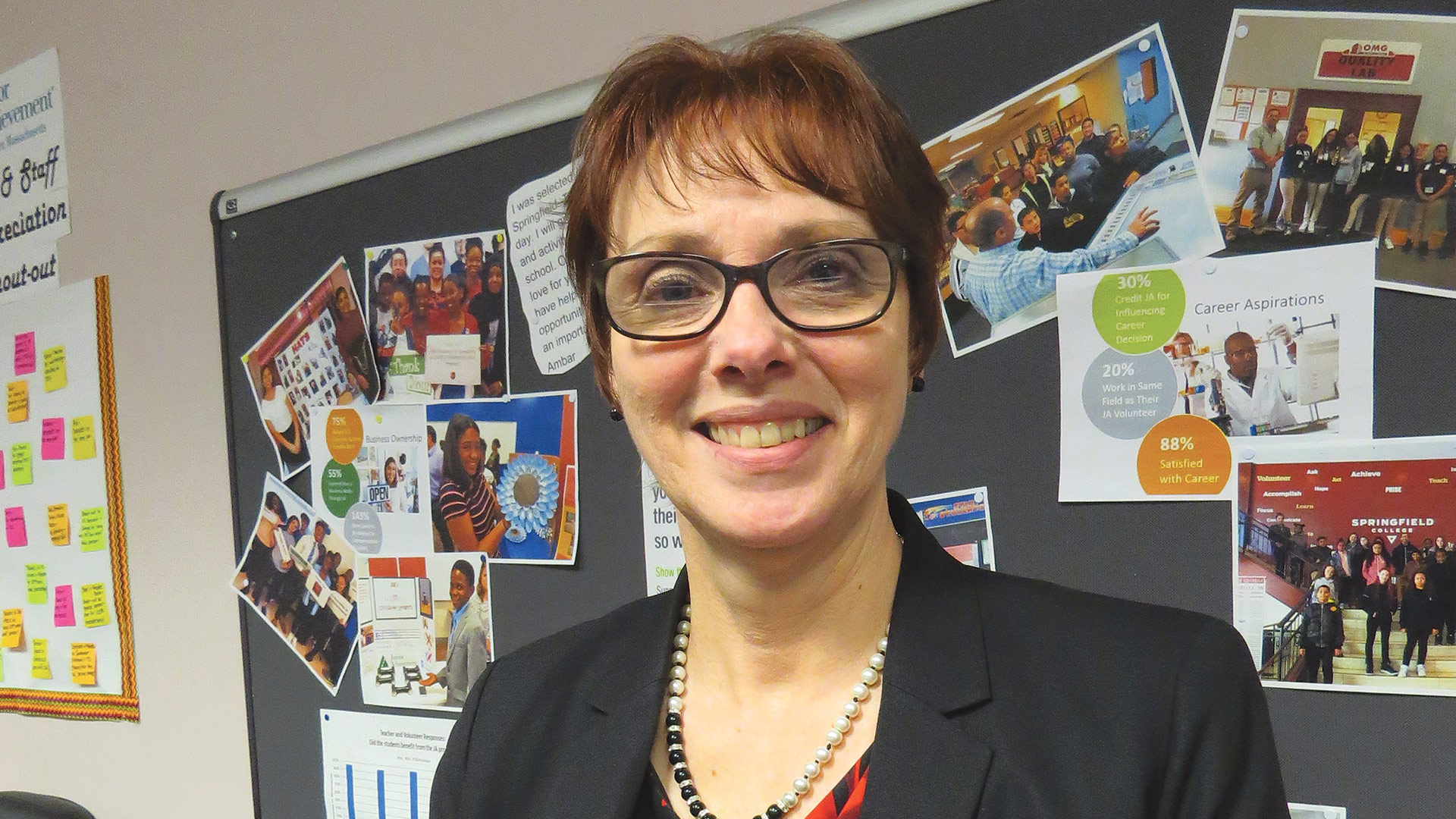
JA Celebrates 100 Years of Providing Life Lessons
In Good Company

Jennifer Connelly, left, and Dawn Creighton display promotional materials for the JA Inspire program’s career-exploration fair set for May 28.
The 100th Anniversary Gala for Junior Achievement of Western Massachusetts will have a decidedly ’20s flair — as in the 1920s. In fact, the theme is “The Roaring ’20s are Back.”
Attendees are encouraged, but not required, to come in period dress, a challenge that Jennifer Connelly, executive director of the local JA chapter, met (with considerable help from her daughter) by doing a hard search online that yielded the appropriate dress as well as a headband with a feather.
“I’ll have the long gloves and the long cigarette holder — a full outfit; it will be very interesting to see what people come up with to mark the ’20s,” she said with a trace of understatement in her voice.
But while the gala will amount to an effort to turn back the clock in many respects, Junior Achievement, and especially its Western Mass. chapter, have been turning the clock forward, focusing on the 2020s — and the decades to follow — with a host of programs that are seemingly far removed from the organization’s original mission to introduce young people to the principles of business — but then again, not very far removed at all.
Programs like JA Inspire.
Created by a coalition of education and industry leaders led by JA of Western Mass., this endeavor is designed to introduce young people to industry sectors and careers, and also provide awareness of what skills will be needed to thrive in those settings.
At the heart of the initiative is a massive career fair set for May 28 at the MassMutual Center that won’t follow the typical model for such events.
Actually, it will, but the audience will be decidedly different. Instead of people looking for jobs they can enter in a few weeks or even a few days, those roaming the aisles will be middle- and high-school students gaining information on jobs they might fill sometime in the next decade.
“We’re going to have representatives of a number of industry clusters, and we’ll also have representatives of the post-secondary schools in this area,” said Connelly, “so students can understand that there is a pathway to a career that they might be interested in.”
In many respects, JA has always been about identifying and illuminating pathways, and JA Inspire is just one example of how this nonprofit has stayed true to its original mission while also evolving over the years and expanding into programs, 23 of them in all, for students in grades K-12, said Connelly.
These programs provide lessons in everything from how government works to how large a slice of one’s paycheck the IRS takes; from how global the global economy truly is to the all-important difference between a ‘want’ and a ‘need’ when it comes to how one spends their money, she said, adding that, to get these messages across, JA relies (as it has throughout its history) on volunteers.
“We try to make that match between what they’re learning and why it’s important, and it’s very rewarding work.”
People like Sharon Dufour, chief financial officer at Ludlow-based LUSO Federal Credit Union and a JA volunteer for more than 30 years, 20 of them in this market. She has been instrumental in bringing JA programs into schools in the Wilbraham/Ludlow area, and also in moving beyond traditional school-banking initiatives — where students learn the basics of banking — and into financial literacy.
She’s taught at all levels, including seventh grade and a program called “JA is My Future,” which helps students understand the value of what they’re learning.
“It helps them understand the skills they’ll need for specific jobs,” she explained,” adding that, in the last full school year, LUSO helped coordinate 130 classes for Junior Achievement, reaching 2,810 students. “We try to make that match between what they’re learning and why it’s important, and it’s very rewarding work.”
Julie Ann Pelletier agreed. A retired transplant to the Berkshires just over a decade ago, she was looking for volunteer work to take on and certainly found it with JA — she now coordinates the agency’s programs across the Berkshires.
One of them is an initiative to promote entrepreneurship in high-school students, for which they needed a product that students could design, make, market, and sell. Pelletier helped inspire one — crocheted hats (she teaches that art).
Fast-forwarding, she said she wound up teaching a number of Putnam Vocational Academy students that skill, and a few of them went on to start their own businesses and eventually win business competitions as they moved their ventures forward.
“I’m 72, and they’re 17, so they called it ‘Twisting the Generations,’ — it was the old school teaching the new school,” she said, summing up quickly and efficiently what JA, and its volunteers, have been doing for the past century.
For this issue and its focus on nonprofits, BusinessWest examines all that JA is celebrating as its marks an important milestone — 100 years of not only teaching young people about business, but preparing them for all that life can throw at them.
Getting Down to Business
Connelly told BusinessWest that JA’s 100th birthday bash will be a year-long celebration, one that has a number of goals, from honoring the past to raising awareness of its many programs and initiatives in an effort to ensure sustainability.
It will be capped, in most respects, by a series of events on Sept. 28, when JA National, as it’s called, which is based in Colorado, will stage JA Day at the Big E, home to the first Junior Achievement building ever erected — funded by Horace Moses, president of Strathmore Paper Co., and one of three men who founded JA in 1919. There will be a parade, speeches, and a dinner, and Connelly is expecting representatives from many of the 107 JA chapters nationwide to be in attendance.

Jennifer Connelly says JA has evolved considerably over the past century, but remains true to its original mission.
Locally, the immediate focus is on the May 4 gala, to be staged at MGM Springfield, an event expected to draw more than 300 people. The list of attendees includes two descendants of U.S. Sen. Murray Crane of Massachusetts, another of the founders (the third was Theodore Vail, president of AT&T), as well as a representative of Strathmore Paper.
So there will be significant ties to the past, said Connelly, adding that the gala will honor the agency’s founders, but also all the change and evolution that has come over the past century, and there has been quite a bit of both, as her quick history lesson shows.
“When they founded JA 100 years ago, it started off with what they called the company program,” she explained. “Students came together, formed a company, and sold a product; they envisioned a way to help young people transitioning from an agrarian-based economy to a manufacturing-based economy.”
A glass display case in the front lobby of the JA’s offices on the second floor of Tower Square holds artifacts that speak to those early days of the company program, everything from ribbons awarded at a competition in the mid-1920s to a wooden lamp built by area high-school students to later sell. (Connelly isn’t sure of the date on that item, but guesses it’s from the mid-’70s.
The student-company initiative continues to this day, she said proudly, noting that a number of area high schools run the program after school, during the summer, and as part of the regular school day.
Pathfinder Regional High School, for example, has expanded its program to includes a Facebook page, she said, adding that one class is enjoying success with selling a brush designed for pets called Brush It Off.
But over the past 30 years or so, JA has taken on a broader role, one certainly in keeping with the founders’ intent, especially within the realm of financial literacy. And that role will likely become deeper still following the passage of a bill in January that allows state education officials to establish standards around financial literacy, which schools could incorporate into their existing curricula in subjects like math, business, and social sciences.
The standards will be guidelines, not a mandate, said Connelly, adding that, for those schools who wish to adopt these guidelines, JA could become a partner in helping to bring those lessons home.
The agency already provides a wide array of financial-literacy programs to students in grades K-12, she noted, citing, as one example, something called the Credit for Life Fair, staged recently at Elms College, a program created for high-school students.
Students essentially choose a field, are given a budget, and are presented a number of options on how to spend their money — from investments to essentials like housing, a car, and groceries, as well as ‘fun’ items. They then visit with a credit counselor to review their choices and discuss the consequences of each one.
“These are great learning experiences,” Connelly said of the fair, several of which are conducted each year. “They actually get to see that, even if they get a good job and make a lot of money, that money doesn’t go too far. And they learn about the importance of having a good credit score; they can be a doctor and make a lot of money, but if they have a bad credit score, that’s going to hurt them down the road.”
The Job at Hand
While JA is providing young people with a look at life in a chosen profession through these Credit for Life programs — well, sort of — it is also introducing them to industry sectors, career paths, and specific jobs through initiatives like the JA Inspire program and the aforementioned event at the MassMutual Center.
The formal name of that gathering is the Inspire Career Exploration Fair, and that’s appropriate, because that’s what the attendees will be doing — exploring. And while they’re doing that, area employers might be getting some help with the biggest problem they face these days — securing a workforce for the future.
“Every employer in every industry sector is experiencing workforce shortages,” said Dawn Creighton, Western Mass. director for Associated Industries of Massachuetts, which came on board as a sponsor of the initiative early on and has been encouraging its members to take part. “People are not ready for the workforce, whether it’s vocational skills, technical skills, soft skills — they’re not ready.”
The career-exploration fair was conceived to help ensure that the next generation of workers is more ready, she went on, by not just introducing young people to career possibilities they may or may not have known about, but also spell out for them what it will take to land such a position in terms of skills and education.
And that’s why the event has caught the attention of businesses in several sectors, from manufacturing to healthcare to financial services, and from every corner of the 413, said Creighton, adding that all see a chance to open some eyes.
“All too often, these types of career days come during the spring of senior year, and by then it’s often too late,” she told BusinessWest. “We need to introduce young people to all the career opportunities out there, and we need to do it earlier.”

Sharon Dufour, long-time volunteer with JA, is seen here with third-graders as she provides lessons about zoning and building a city.
Thus, the fair, as noted, is an example of how JA’s mission has evolved and the agency has moved beyond the classroom in many respects. But area schools are where most of JA’s life lessons are delivered, a tradition that began a century ago and continues today through the work of teachers and especially volunteers.
Dufour has worked to recruit them for years and said more are always needed to help JA reach more young people.
“I tell every volunteer I know that it’s the most rewarding experience you can imagine,” she said. “The kids see you; they remember you. I once had a kid come flying across the Stop & Shop to give me a big hug. Her mother said, ‘my daughter does not stop talking about you.’”
Pelletier agreed, and said the rewards from volunteering come in many flavors, especially the satisfaction that comes from seeing a light go on in a young person’s eyes as they realize their potential to take an idea or a skill (like crocheting) and run with it.
“Once people get the basics, they fly,” she said, referring specifically to crocheting, but also to the many principles of business in general. “And it’s incredibly exciting to watch it happen.”
Past Is Prologue
“The future of our country depends upon making every individual fully realize the obligations and responsibilities belonging to citizenship. Habits are formed in youth. What we need in this country now is to teach the growing generations to realize that thrift and economy, coupled with industry, are as necessary now as they were in past generations.”
Theodore Vail spoke those words a century or so ago when JA was in its infancy. But they certainly ring true today, especially that part about habits being formed in youth.
Helping young people develop the right habits has been JA’s informal mission for 100 years now. There are now more ways in which in that mission is being carried out, but it’s still about pathways and putting people on the right ones.
And that’s a proud history worth celebrating.
George O’Brien can be reached at [email protected]





